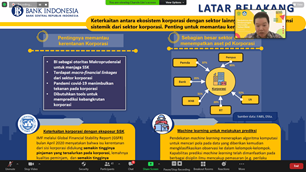Culture’s Merdeka Campus Competition Program in 2021. With regard to the achievement of this competition grant, Parahyangan Catholic University’s Accounting Study Program organized a series of activities, one of which was the debriefing and mentoring of the Accounting Competition Team by inviting accounting alumni and practitioners to deliver the materials for around 35 students of the Accounting Competition Team selected from the classes of 2018 and 2019.
The students gained a variety of knowledge experiences with current topics relevant to the competition and the future of the competition team in the workplace. On Saturday, July 31, 2021, an online briefing was held by inviting UNPAR alumni class of 2010, Mr. Charvin Lim. He continued his studies at The University of Nottingham, United Kingdom, from 2015 to 2016. His career experience began at the Center of Risk Management Studies as a researcher, and he continued his career as a lecturer at the Development Economics Study Program, Faculty of Economics, Parahyangan Catholic University. Currently, he works at Bank Indonesia as an Assistant Manager in the macroprudential policy assessment section.
On this occasion, Mr. Charvin presented the theme of Macroprudential Policy, which will undoubtedly give a lot of insights to the Accounting competition team of the Faculty of Economics at Parahyangan Catholic University. He explained that the regulatory object of macroprudential policy is the financial system, where the financial system has five elements, which are Financial Institutions (78% of bank institutions and the remaining 22% of non-bank institutions), Financial Markets, Financial Market Infrastructure, Corporations, and Households. These components interact with each other in funding or providing financing for the economy. This interaction is in the form of intermediation activities, where parties experiencing surplus units will help or allocate their funds to parties with deficit units. However, there are several potential risks in this financial system, including information asymmetry, build-up risk due to risk-taking behavior, contagion risk due to interconnectedness, financial product innovation that can cause financial crises, financial institutions that are too large so that monopoly potential arises, and common risk factors due to moving in the same sector.
 Program Studi Akuntansi Universitas Katolik Parahyangan
Program Studi Akuntansi Universitas Katolik Parahyangan


